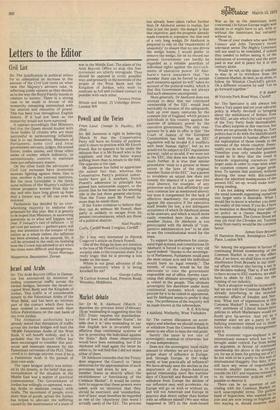Civil List
Sir: The justification in political ethics for so substantial an increase in the amount of the Civil List turns on what view Her Majesty's advisers take, in reflecting public opinion as they should, as to the way the Royal Family stands in relation to society. There is a strong case to be made in favour of the monarchy remaining entrenched with the sources and resources of power. This has been true throughout English history. If it had not been so the monarchy would not have survived.
It appears accordingly that Ministers feel that the Queen should muster with those bodies of citizens who are most successful in surmounting inflation; that is to say themselves, Members of Parliament, some civil and local government servants, judges, the armed forces, trades unions, and those other ranks of society which indirectly, or surreptitiously, contrive to maintain their pre-inflationary stance.
On the other hand the advocates of Civil List increases have inveterate enemies fighting against them. One is time, another is the national statistics. But the most formidable is the third, some millions of Her Majesty's subjects whose prospects worsen from day to day and who have long given up hope that' a former way of life can ever be restored.
Parliament has decided by an overwhelming majority to endorse the pthposals for this year. But it is greatly to be hoped that Ministers, in answering questions as to what will happen next year, if January's rate of inflation — 31 per cent per annum — gathers pace, will pay due attention to the temper of the nation as a whole (when the inflation has been arrested, as be assured, Sir, it will be arrested in the end) on realising how the Crown was advised to act when the times were difficult and dangerous.
Victor Montagu Mapperton, Beaminster, Dorset


































 Previous page
Previous page